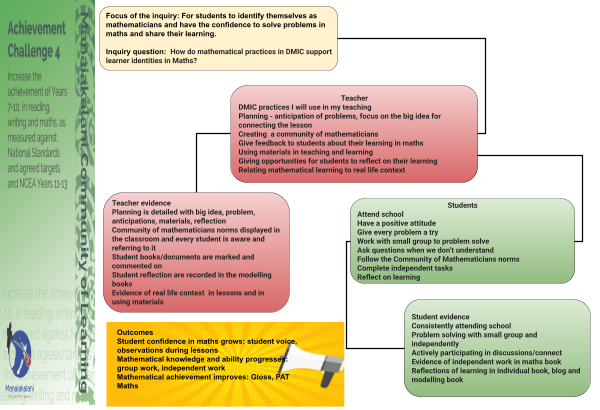How do mathematical practices in DMIC support learner identities in Maths?

The shift in student independence in solving mathematical problems has been evident in my anecdotal notes of lessons during this year. There was also a shift in the students' reflection in their maths books of how they have been learning in maths. At the beginning of the year, many students preferred to let what they perceived as able mathematicians take over the problem solving. Towards the middle of the year, there was a gradual shift in students giving their ideas to discussions which lead to students leading or facilitating discussions.
Through a consistent emphasis on participation, the students in my target group understood they were to take part in problem solving and if they did not know what was being discussed, that they could raise their hand and ask questions for clarification. Upon reflection, I have thought about do my students need to be taught strategies they could follow when they do not understand? Do my students needs to be taught how to ask questions? Clarify misunderstandings? Note take? I have concluded that students do need to be taught what they could do when they do not understand. Often, students will prefer not to ask because they do not want to be highlighted as the student who does not understand. How can I as a teacher, create and encourage an environment of collaboration and support for all students so they are able to learn and re-learn at their own pace?
The DMIC tasks are given to schools who implement DMIC. Teachers are to take the tasks and plan for their lessons using a template which was provided from the DMIC programme. Reflecting on the planning part of DMIC, I know that there needs to be more consideration about the students who are below their expected achievement level in maths. How can the students who have a lot of gaps in their knowledge, build on their knowledge so they are able to solve problems in their expected levels. We have been considering and anticipating misconceptions students can have in their strategies when solving problems, but I feel it is not enough for students to learn a new strategy and consolidate a strategy within a week. Possible solution? Workshops during the week.
Student voice, peer collaboration. This is something I have worked very hard to implement in my lessons this year. From the start, we have included student voice and peer collaboration in our Community of Mathematicians norms. I am very confident to say that, in my class teaching, all my students are able to work with any peer they are partnered with. This is a great way to build inclusiveness in the class. For the whole class to be inclusive and to value the collaboration between peers.
Assessment data
The summative data from the maths assessments shows most of the students in my target group have made progress in their maths testing. One student who did not do very well in their PAT test was due to lack of effort during the test (student JF Y8). Was really pleasing to see the students' progress in the Gloss test as well as the PAT maths test. During the Gloss testing, it was evident the students wanted to keep trying to answer the questions in the test. They had the perseverance and the determination to give all the questions a chance to solve them.
Where to from here, while the learner identities and self confidence of the students were strengthened in this teaching as inquiry, I have realised, the assessment data proves that there are a lot of mathematical knowledge that students lack and therefore hindering their progress in mathematics as shown in the assessment results.
What leads to students lack of confidence in maths? What can be done early in their education journey to address these? What is a good balance for problem solving to develop mathematical inquiry communities and mathematical workshops for student content knowledge?
These are some of the questions I have been reflecting on for further steps from this year's inquiry. There is a great need for students to have workshops to build their mathematical knowledge. Students also need to be assessed throughout the year in both formative and summative assessments. Another aspect I want to explore more into my practice is the collaboration between student and teacher in teaching and learning. How involved are students in the decisions making about their leanring? How can I consistently factor in student voice in their learning?
